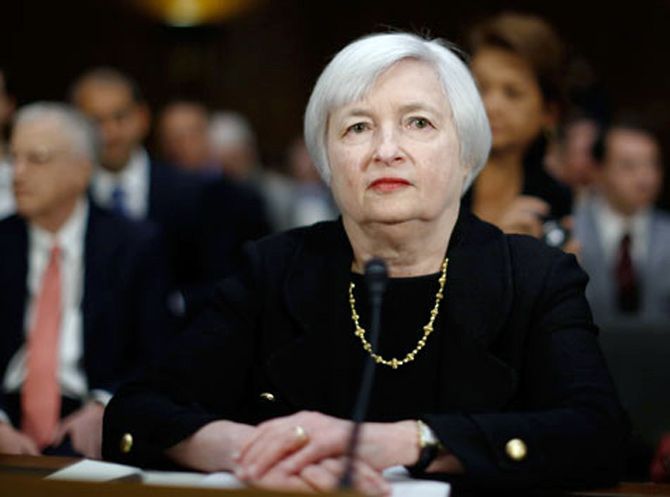Three major central banks have hit the zero limit, the Fed, the European Central Bank and the Bank of Japan.
 When the Federal Reserve drove its target interest rate near zero in late 2008, it sparked an economic debate about the risks of having nowhere lower to go, and in particular the financial bubbles it might stoke.
When the Federal Reserve drove its target interest rate near zero in late 2008, it sparked an economic debate about the risks of having nowhere lower to go, and in particular the financial bubbles it might stoke.
Six years later few bubbles are in sight, but a new risk has emerged: that the zero has become an effective anchor on interest rates that is proving far more difficult to abandon than the Fed expected.
Three major central banks have hit the zero limit, the Fed, the European Central Bank and the Bank of Japan. None have successfully escaped it and the ECB looks set to extend its money printing program.
Though Fed officials insist the United States can and will eventually break ranks with the rest of the pack and hike rates, their latest decision to hold on Thursday came laced with caution about the new butterfly-effect economy – where a market ripple in China could tighten financial conditions in the United States and change the course of the Fed.
It is a situation that could leave the Fed stranded in its hunt for a rate liftoff until the entire global economy is growing in synch, and the horizon is clear of risks.
"There may be labour slack and we may not have hit the inflation target, but where is it written that everything has to line up before you even begin to get rid of emergency measures?," said Erik Weisman, chief economist with MFS Investment Management. "These conditions are never going to be met entirely."
This week's decision to yet again delay a rate hike "is the beginning of the Fed taking on board the idea that excess global capacity is playing a bigger role in determining domestic wages and prices," said Steven Ricchiuto, chief economist with Mizuho Securities USA.
During her news conference Fed Chair Janet Yellen referred repeatedly to global events that had affected the U.S. economy, undermined inflation, and threatened to hurt domestic growth.
For much of the past year Fed officials have said they expected those factors, from low global oil prices to the strong dollar and now a weakened China, to fade and give way to higher inflation and rising wages more in line with the current low U.S. unemployment rate.
But the latest economic projections from Fed policymakers pushed that moment further into the future, with inflation not expected to reach the central bank's 2 percent target until 2018 even though unemployment was expected to hit a low level of 4.8 percent.
Yellen said she still believed the fundamental mechanics of an economy will eventually kick in, and lead to more inflation, but the central bank seemed as uncertain as ever as to when that might happen.
GLOBAL RISKS
There is "a sea change at the Fed, where they’re in increments changing the battlefront from fighting inflation to fighting the systemic downside risks that exist in a global economy," said Robert Tipp, chief investment strategist at Prudential Fixed Income in Newark.
It is an uncomfortable situation for a central banker. Monetary policy is built around the use of a primary tool - raising and lowering a target interest rate - to encourage economic expansion, or cool an economy at risk of overheating and generating too much inflation.
When rates are at zero, that tool loses its usefulness: it cannot be cut any further, forcing the use of extraordinary measures such as purchases of vast quantities of securities, known as quantitative easing, to fight any new downturn.
Research at the Fed's Jackson Hole summit this year discussed other risks, including that the low inflation and low interest rate world of the "zero lower bound" could raise the probability of long-term deflation. That is the situation Japan has faced, with what seems now a deeply entrenched economic environment of low or no price increases and zero rates.
Europe is also facing an extended stay at the zero level, with little sign of a pick up in inflation or growth.
As with the United States, that may be a sign that global demand, global wage levels, and global growth may shape Fed policy more than U.S. officials have acknowledged. It is a situation all too familiar to developing world officials, who have often complained that their economies are overly exposed to what happens in the United States or other large nations.
That may now be the global norm.
“If you are incorporating global economic and financial market developments into your calculus then it will be very difficult for this Fed to get off of zero," said Tom Porcelli, chief U.S. economist for RBC Capital Markets.






